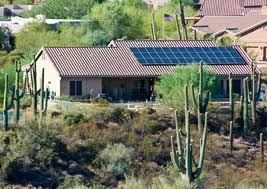As the tug of war continues between the solar industry and utilities, which are pushing back against net metering, early results are in from the first test – in Arizona.
Since November, when Arizona started charging $5 a month to people who have rooftop solar, new solar installations have plummeted in Arizona Power’s service area, while they keep growing elsewhere. Only 280 solar systems were added in January, down from 583 a year ago.
"It will be difficult for any solar company to stay in that market," Bryan Miller of SunRun, told AZCentral.

And the $5 charge was a compromise – the utility wanted $50 a month. To get there, anti-solar lobbyists have introduced legislation that would raise property taxes for people who lease solar systems – about 80% of solar systems in Arizona.
Clearly, HB2695 is designed to remove any incentive for people to add solar in the sun-drenched state.
"It’s obvious our work as far from over as this utility monopoly looks for new ways tax a competitor out of the market," remarks Barry Goldwater, Jr., Co-Chair of TUSK (Tell Utilities Solar won’t be Killed).
Arizona Public Service also wants to end the solar carve-out in the states Renewable Portfolio Standard, which requires 15% renewables by 2025. Of that 30% must come from distributed sources like solar. Utilities say the solar will grow without the mandate so they want it to end. The state granted them a waiver while they think about it.
"Arizona utilities have never supported the distributed generation standard," Sandy Bahr, director of Sierra Club’s Grand Canyon Chapter, told AZ Central. "That’s no surprise because it doesn’t fit their business model of keeping control centralized with large power plants."
15 States
As we expected, the war on net-metering is popping up in lots of states ala ALEC and others – about 15 states so far. In Kansas, HB2458 has passed out of the energy committee. It allows utilities to pay solar customers less than the retail rate for solar electricity, while utilities re-sell it to their neighbors at the retail rate. That’s an improvement from the original bill, which would have eliminated net metering.
Claiming solar is a cost, Xcel Energy, Colorado’s largest utility, also doesn’t want to pay retail electricity rates to customers that send solar to the grid.
The purpose of net metering, says Xcel, was to support a "nascent
industry." Now, solar owners should pay for the privilege
of using the electric grid." Xcel currently pays 10.5 cents per kilowatt-hour for net-metered customer-supplied power, and wants that cut to 4.6 cents.
At the Colorado Solar Energy Industries Association conference – where the net metering discussion took center stage – John Stanton of SolarCity called for utilities to do a full-cost accounting that solar provides. Solar shaves peak demand, helping utilities avoid investments in new infrastructure, eliminates fuel costs, and provides "free electrons" to the grid, he said.
"There is no question this is a war of business models and who has access to distributed solar," Meghan Nutting, director of policy and electricity markets at SolarCity, told The Denver Post.
NRG Sees It Differently
Unlike other power providers, NRG Energy is embracing distributed solar, calling its largest growth area. It plans to offer rooftop solar to its 2.3 million customers. On-site generation is a growing market for business customers, says CEO David Crane.
"We are positioning ourselves to succeed during a prolonged period during which the traditional centralized grid-based power system coexists with the fast emerging, high growth distributed sector, much like how fixed line long distance graciously gave way to cellular world dominance only after a couple of decades of relatively peaceful coexistence," says Crane.
Crane sees residential solar as being cost competitive with traditional energy in the next 12-24 months in roughly 20-24 states.
"Off-grid" solutions are another area of focus – a mix of renewables, energy storage and localized automation to balance production and load.
The company, which spun off NRG Yield in an IPO, is also working on commercializing the a two-way interface between electric cars and the power grid.
Read more about opinions on both sides of this battle:
